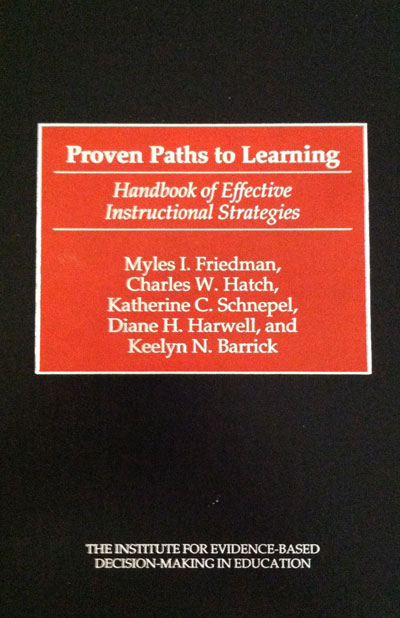
ISBN 978-0-9666588-9-7
7" X 10" hard cover
962 pages
( by Mail or Phone )
When you visit your medical doctor you expect that person to be well apprised of current research, drugs and treatments. However, this is most often not true in the field of education where most professionals do not have a good grasp of research findings.
Proven Paths, in 962 pages, includes:
All the above is based on the analysis of over 4500 separate and distinct research articles and is current through the publication date (2014). There exists no other publication comparable to this distillation, summarization and organization of educational research, none.
Proven Paths holds great utility for:
Charles W. Hatch, Ph.D. is President of CWH Consulting Co. Inc., Newberry, SC. He earned a Master of Arts in Teaching at Johns Hopkins University and a doctorate in Educational Research and Measurement at the University of South Carolina. He taught college courses on tests and measurement, statistics and test preparation. Dr. Hatch has served as a consultant on test preparation, college retention, computers and software. Dr. Hatch is affiliated with the Friedman Institute for Evidence-Based Decision-Making in Education (EDIE). He authored Pass That Test: A Guide to Successful Test Taking (2008) and co-authored the Educator’s Handbook on Effective Testing (2003) with Dr. Myles Friedman et al. He also co-authored Pass That Math Test (2011) with Micki Gibson. Dr. Hatch lives in Newberry, SC with his family.
Myles I. Friedman, (1924-2007), Ph.D., Distinguished Professor Emeritus of Education at the University of South Carolina and former CEO of the Institute for Evidence-Based Decision-Making in Education, earned master's and doctorate degrees in Educational Psychology from the University of Chicago. He was sole or senior author of eleven professional books including Teaching Reading and Thinking Skills, Improving Teacher Education, Teaching Higher Order Thinking Skills to Gifted Students, Taking Control: Vitalizing Education, Ensuring Student Success, Handbook on Effective Instructional Strategies, and Educators' Handbook on Effective Testing. He spent more than 30 years conducting and applying research to improve education and founded the doctoral program in educational research at the University of South Carolina.
Keelyn N. Barrick, has earned an educational specialist degree in Counseling Education from the University of South Carolina and a bachelor of science degree in Psychology from the University of Pittsburgh. She is presently pursuing a license in Marriage and Family Therapy. She has served as an educator of children, an entrepreneur, and an advocate of the Juvenile Diabetes Research Foundation. She is an active member of American Counseling Association, American Association for Marriage and Family Therapy, and Chi Sigma Iota Counseling Academic and Professional Honor Society International.
Diane H. Harwell, Ph.D., has earned an educational specialist degree and a doctorate in Educational Administration from the University of South Carolina and bachelor’s and master’s degrees in English. She presently serves as Clinical Professor in the Department of Educational Leadership and Policies, University of South Carolina. During her 48 years in education she has also served as teacher, assistant principal, district consultant for curriculum and instruction, and coordinator of school improvement, professional development, and leadership training at the South Carolina Department of Education. She serves as a consultant to help schools improve their instructional programs and help teachers enhance their teaching skills.
Katherine (Casey) Schnepel, Ph.D., is a self-employed consultant on instruction and educational research. She has earned master’s and doctoral degrees in Educational Research with an emphasis on instruction and a bachelor’s degree in Psychology. She has served as an adjunct professor in the Departments of Educational Psychology and Educational Leadership and Policies at the University of South Carolina. She has made presentations on effective instruction and has been engaged in the evaluation of instructional programs. She is the author of the “Instructional Prescription Testing” section of the Educatiors’ Handbook on Effective Testing. She has been involved in numerous evaluations of instructional programs throughout the Southeast. Her primary role in these evaluations was conducting classroom observations and interviewing of teacher and administrators.